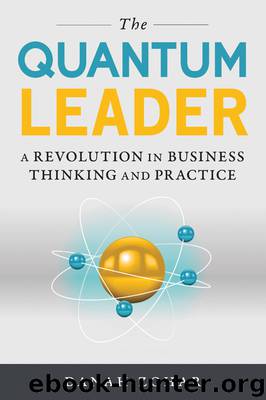The Quantum Leader by Danah Zohar

Author:Danah Zohar
Language: eng
Format: epub
ISBN: 9781633882423
Publisher: Prometheus Books
Published: 2016-08-17T16:00:00+00:00
The idea of a quantum self is a new model of the self derived from the characteristics of the new science, particularly those of quantum physics. I first introduced it twenty-five years ago in my book The Quantum Self. I believe this new model of self can transcend the divide between the classic Western and Eastern (or rural) models and can underpin a new theory of organization and leadership.
The nature of human consciousness and human creativity is at the cutting edge of scientific inquiry today. The majority of mainstream cognitive scientists still believe that both will ultimately be explained in mechanistic terms. We have, they say, a “mind machine” inside our heads. One day, they believe, we will have computing machines that can do anything we can do, probably better and faster. But there is another school of scientific thought that believes human consciousness can never be mimicked by machines. In principle, they say, mind is not machinelike. These scientists look for the origins of consciousness and creativity in brain processes not described by Newton's physics.
Many believe these more creative mental processes are quantum in origin, that quantum physics literally makes possible the characteristics of the human self—humor, grief, relationship, creativity, a sense of meaning, understanding, free will, loyalty, commitment, and so on. Personally, as I discussed at length in The Quantum Self, I back quantum theories of mind.1 But these theories are still speculative, and we needn't wait for the scientific evidence to come in. It is sufficient for purposes of this book that all these interesting features of human thought and behavior are quantum-like. They function as though arising from quantum structures or processes in the brain, whatever their true foundation. As I mentioned in an earlier chapter, the new branch of cognitive science called “quantum cognition” has produced hundreds of research papers detailing the similarity between human thought processes and quantum mechanical processes. That is sufficient to support my goal here is to find a new conceptual structure for organizations.
So far, we have seen two diametrically opposed models of the self and their effect on organizations. The particle model of the self, so important to Western management theory, is modeled on Newtonian science. This Newtonian self, like the science that inspired it, is seen as atomistic, determined in its behavior, fragmented into separate parts circumscribed by rigid boundaries, and isolated from its environment. Newtonian organizations are rule-bound, exclude private, unpredictable aspects of the self, divide functions and structures, and they, too, are isolated from their environment. These organizations function very much like the brain's one-on-one like neural tracts, which give us logical, rational, rule-bound, how-to thinking. This is our “first kind of thinking.” It gives us our “mental intelligence (IQ).”
The Eastern, wave model of the self, lying at the heart of networked Asian organizations (and small rural communities worldwide), is modeled on the complex patterns made by countless intersecting waves. Like waves, the networked self is seen as essentially relational and contextual. A person is his or her relationships.
Download
This site does not store any files on its server. We only index and link to content provided by other sites. Please contact the content providers to delete copyright contents if any and email us, we'll remove relevant links or contents immediately.
Hit Refresh by Satya Nadella(9115)
The Compound Effect by Darren Hardy(8918)
Change Your Questions, Change Your Life by Marilee Adams(7732)
Nudge - Improving Decisions about Health, Wealth, and Happiness by Thaler Sunstein(7689)
The Black Swan by Nassim Nicholas Taleb(7097)
Deep Work by Cal Newport(7054)
Rich Dad Poor Dad by Robert T. Kiyosaki(6590)
Daring Greatly by Brene Brown(6500)
Principles: Life and Work by Ray Dalio(6401)
Playing to Win_ How Strategy Really Works by A.G. Lafley & Roger L. Martin(6202)
Man-made Catastrophes and Risk Information Concealment by Dmitry Chernov & Didier Sornette(5995)
Digital Minimalism by Cal Newport;(5743)
Big Magic: Creative Living Beyond Fear by Elizabeth Gilbert(5739)
The Myth of the Strong Leader by Archie Brown(5490)
The Slight Edge by Jeff Olson(5405)
Discipline Equals Freedom by Jocko Willink(5371)
The Motivation Myth by Jeff Haden(5199)
The Laws of Human Nature by Robert Greene(5154)
Stone's Rules by Roger Stone(5073)
